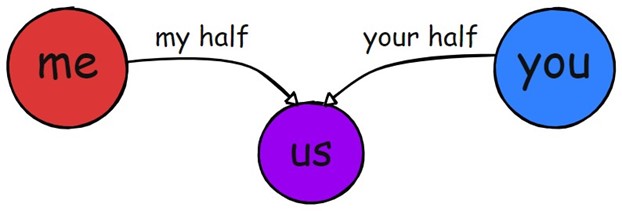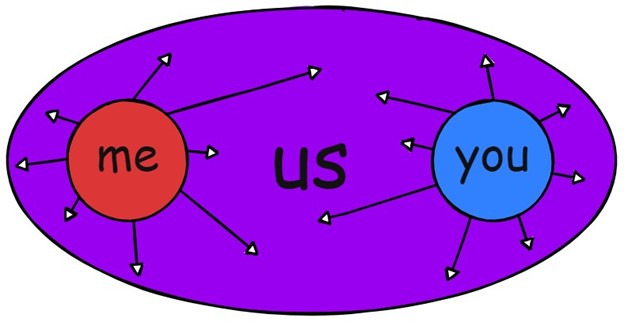
The standard way to approach a relationship is what I call the “50/50 mindset.” Each person contributes half to make a whole. This sounds reasonable and fair, which is why it’s ubiquitous.
Here’s a visual:

Unfortunately, the 50/50 mindset has a number of shortcomings that explain why 50/50 relationships don’t work.
The Trouble With 50/50 Relationships
It’s human nature to be biased about your social contributions.1,2,3 Because of this, you probably:
- Think you’ve done more than you actually have
- Think others have done less than they actually have
- Think your efforts are more skillful than they truly are
- Think your contributions are more valuable than they truly are
And I’m not pointing the finger at you, personally. Everyone does this, unconsciously.
Now, consider how this plays out in a 50/50 relationship. Both partners think they’re doing more than their fair share, even though they’re not. 50/50 ends up being 40/40, and 20% of the shared work doesn’t get done.
Worse still, both partners think they’ve done more than enough, and it’s the other person who needs to do more! This leads to acting entitled and feeling bitter.

And even if we weren’t biased, when you bring a 50/50 mindset to your relationship, you’re setting yourself up to feel resentment if the other person doesn’t do “their half.” This resentment could easily lead to arguments involving what marriage expert John Gottman calls “the four horsemen” of divorce: criticism, contempt, defensiveness, and stonewalling.4 When marital interactions frequently involve these four elements, divorce is likely.
What is half, anyway?
What constitutes “half” of the work of maintaining a household is very hard to parse out. Does it mean equal time or equal difficulty? What if one person spends more hours at work than the other? What if one person makes more money? Trying to figure this out is a headache, a waste of time, and not at all the right mindset to bring to a relationship.
Furthermore, specialization of labor makes good sense. Who does what should, in part, be determined by who is more skilled and which kinds of labor each person prefers. I’m usually in charge of cooking, while my wife is in charge of sewing projects. I like doing the dishes, but dislike unloading the dishwasher. Christina is happy to trim Benny’s nails, but she doesn’t want anything to do with the litterbox.

It’s also not necessary or even logical to split the work 50/50 all the time. Who’s doing more may change depending on the time of day, time or year, or season of life. That’s why wise thinkers from Brené Brown5 to Michelle Obama6 have observed that marriage is never 50/50.
A Better Way
A far better mindset to bring to your relationships is the “100/100 mindset.” This means, rather than aiming to contribute 50%, you aim to give 100%. You give all that you can and trust that the other person is too.
Don’t waste any mental energy thinking about what your “fair share” is. Just be all in. Be too busy contributing to worry about whether or not anyone’s pulling their weight.
The result is a far greater “us” than you get from a 50/50 relationship.
Here’s a visual:

“Us” is a place we’ve built together to thrive in together. It’s a non-zero-sum game. Every effort from either person is mutually beneficial and provides a shared return on investment.
This is a far more enlightened way to think about your partnership. Your growth is my growth is our growth. If you benefit, I benefit because we benefit.
Back-and-Forth but Not 50/50
Now, there is a healthy form of back-and-forth in a 100/100 relationship.
Sometimes, you’ll be the one pulling the extra weight; sometimes, it will be your partner. You get to have bad days (or weeks or months), and so does your partner. You both have permission to be human.
And sometimes, neither of you will be capable of showing up fully or picking up the slack, and that’s okay too.
To deal with this inevitability, Brené Brown recommends communicating how much you’re able to show up (“I’m at a 20 today.”) and collectively making a plan of action to be kind to each other and to yourselves.7
What activities, chores, and obligations can be canceled, ignored, or postponed? What can you do to promote rest and recovery?

Shifting Away From a 50/50 Relationship
If, upon reading this, you’re thinking to yourself, Crap, I’m totally in a 50/50 relationship, don’t despair. It’s never too late to change.
If you’ve been playing the 50/50 game for a while, it’s going to take time to shift to the 100/100 mindset.
Sharing this article with your partner is a good place to start, but make sure you do so with an explanation like, “I just read this and realized that I’ve been approaching our relationship with a 50/50 mindset. I’m going to work on shifting toward a 100/100 mindset.” Making it about you will help prevent them from feeling judged or criticized.
However, the most important thing is to lead by example. You have to make the shift first. Do more than your “fair share.” Surprise your partner with extra effort.
Going Above and Beyond
“Outperform your contract.” –J.J. Watt8
It never hurts to go above and beyond, to do more than is expected of you. No one ever comes home from work and is upset to discover that their husband vacuumed the house because he had 15 minutes to spare.
And since there’s going to be slack, someone has to pick it up. Why not you?
But it’s not my fault. I’m not responsible for that.
Perhaps, but that’s not what matters. What matters is that you’re response-able. You can do something about it, so you should. It doesn’t matter whose dishes are in the sink; wash them. It doesn’t matter who made the mess; clean it up.
And this is true for all kinds of relationships, not just romantic ones, as Seth Godin explains:
“The math is simple: many people do less than they should.
They might be selfish, but it’s [more] likely that they’re struggling with a lack of resources or a story of insufficiency. Either way, in any community or organization, many people contribute less than their peers.
Whether it’s splitting a check, getting a project done or making an impact on the culture or a cause, if you want things to get better, the only way is to be prepared to do more than your fair share.
Because we need to make up for the folks who don’t.”9
What if You’re the Slacker?

Now, you might be worrying, But what if I’m not doing my fair share? What if I’m not doing enough?
As long as you’re doing your best, you’re doing enough. If you’re giving 100%, you literally cannot give more.
And the best way to alleviate this worry – and redress an imbalance if there is one – is to ask. Ask your partner if there’s anything you can do to help support them or support your household. The answer might surprise you.
Sure, it could be something simple, like, “Actually yes. Can you please take out the garbage?” But it might be something like, “Can I please have a shoulder rub?” or “Can we please make sure to hug each other first thing after work?” It might be that what they need isn’t about labor but about connection.
A relationship, a household, is more than a list of chores and a budget. There’s an intangible, emotional aspect to “us” that’s just as important. And we need to be all in on that part too.
1 “Self-serving bias.” Wikipedia.
2 “Egocentric bias.” Wikipedia.
3 “Illusory superiority.” Wikipedia.
4 Lisitsa, Ellie. “The Four Horsemen: Criticism, Contempt, Defensiveness, and Stonewalling.” The Gottman Institute.
5 Brown, Brené. “Marriage is Never 50/50.” The Tim Ferris Show.
6 “Michelle Obama: ‘Marriage is not 50/50.'” NPR.
7 “Dr Brené Brown on Marriage” Tim Ferriss Clips.
8 Johnson, Brian. “Micro Class: Outperform Your Contract.”
9 Godin, Seth. “More than your share.” Seth’s Blog. August 17th, 2022.
